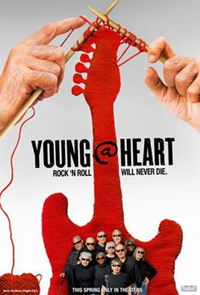Media/Arts
 A Film Review of Young@Heart A Film Review of Young@Heart
By Robert DeLauro, MSW, ACSW
Although you may be inclined (as I was) to cynically dismiss this documentary about an elder chorus singing rock songs, please give it a chance. You won’t be disappointed, and your heart will be touched. Young@Heart finds the right balance of musical entertainment and emotional narrative. It also provokes questions that are of particular interest to social workers regarding the aging process, the place of older adults in our society, and dealing with death.
Since 1982, the Young@Heart chorus has been singing and performing under the direction of Bob Cilman. They have performed locally in Northampton, MA, but have also traveled around the United States, as well as to Australia and Europe. The documentary provides an opportunity to view and listen to the rehearsal process, as well as a number of public performances. Cilman selects popular songs in the rock, pop, or soul categories for the chorus to interpret.
Some of the selections become humorous or ironic when performed by 70, 80, and 90 year olds, such as “Staying Alive” by the Bee Gees or “Should I Stay or Should I Go” by the Clash. On the other hand, the chorus’s rendition of “Yes We Can Can,” written by Allan Toussaint, becomes an even more forceful testimony to resilience than the version made popular by the Pointer Sisters in the 1970s. And even more compelling is the chorus’s performance of Coldplay’s “Fix You” with Fred Knittle, who has congestive heart failure and must carry a canister of oxygen at all times (including on stage), as the lead vocalist. With his beautiful voice, he pays tribute to one of the Young@Heart members who died just prior to the filmed performance. It is riveting.
The aging of America is posing important challenges for our society. It used to be that older citizens simply disappeared from society’s mainstream. They were not considered a viable demographic market, and they were often portrayed in the media as more of a burden than a productive group. But with more financial resources and growing numbers, today’s older adults are redefining “the golden years.” Healthcare and financial security are still their primary concerns and, to date, these issues have been addressed with the usual patchwork approaches that result from our fear of and refusal to develop national social policy.
In addition to drawing out social and political themes, I found this documentary elicited strong, as well as tender, emotions. Some of this was due to Young@Heart striking a chord for me with family and personal experiences. But also, Young@Heart very poignantly reminds us that during the last part of the life cycle, when a person is losing family and friends, it is more important than ever to be active with others, develop a sense of community, and experience the caring of the community.
I know from experience that the spirit of elders, particularly their musical spirit, is commanding and inexplicable. Over the past couple of years, I have arranged concerts by a group called The Show Stoppers (www.musicgiveslife.com) for patients and staff at St. Vincent’s Hospital in New York City. This group of 25 elders aged 60 to 96 are very much like the Young@Heart chorus. Some are seasoned professionals, some are avid amateurs, but they are all incredibly enthusiastic, and they convey an encouragement and affirmation that is simply remarkable. To experience them perform is to recognize that the purpose and the value of the performance is clearly for both the audience and The Show Stoppers.
— Robert DeLauro, MSW, ACSW, is an organization development consultant at St. Vincent Catholic Medical Centers in New York City. He is also president of the New Jersey chapter of the Martin Scorsese Fan Club.
|

 A Film Review of Young@Heart
A Film Review of Young@Heart